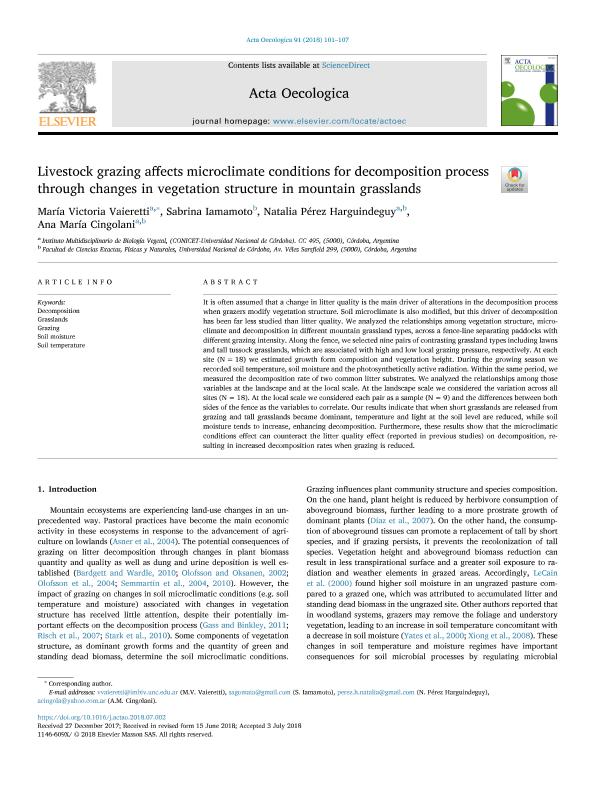Mostrar el registro sencillo del ítem
dc.contributor.author
Vaieretti, Maria Victoria

dc.contributor.author
Iamamoto, Sabrina
dc.contributor.author
Pérez Harguindeguy, Natalia

dc.contributor.author
Cingolani, Ana María

dc.date.available
2019-11-05T17:00:07Z
dc.date.issued
2018-08
dc.identifier.citation
Vaieretti, Maria Victoria; Iamamoto, Sabrina; Pérez Harguindeguy, Natalia; Cingolani, Ana María; Livestock grazing affects microclimate conditions for decomposition process through changes in vegetation structure in mountain grasslands; Gauthier-Villars/Editions Elsevier; Acta Oecologica; 91; 8-2018; 101-107
dc.identifier.issn
1146-609X
dc.identifier.uri
http://hdl.handle.net/11336/88019
dc.description.abstract
It is often assumed that a change in litter quality is the main driver of alterations in the decomposition process when grazers modify vegetation structure. Soil microclimate is also modified, but this driver of decomposition has been far less studied than litter quality. We analyzed the relationships among vegetation structure, microclimate and decomposition in different mountain grassland types, across a fence-line separating paddocks with different grazing intensity. Along the fence, we selected nine pairs of contrasting grassland types including lawns and tall tussock grasslands, which are associated with high and low local grazing pressure, respectively. At each site (N = 18) we estimated growth form composition and vegetation height. During the growing season we recorded soil temperature, soil moisture and the photosynthetically active radiation. Within the same period, we measured the decomposition rate of two common litter substrates. We analyzed the relationships among those variables at the landscape and at the local scale. At the landscape scale we considered the variation across all sites (N = 18). At the local scale we considered each pair as a sample (N = 9) and the differences between both sides of the fence as the variables to correlate. Our results indicate that when short grasslands are released from grazing and tall grasslands became dominant, temperature and light at the soil level are reduced, while soil moisture tends to increase, enhancing decomposition. Furthermore, these results show that the microclimatic conditions effect can counteract the litter quality effect (reported in previous studies) on decomposition, resulting in increased decomposition rates when grazing is reduced.
dc.format
application/pdf
dc.language.iso
eng
dc.publisher
Gauthier-Villars/Editions Elsevier

dc.rights
info:eu-repo/semantics/openAccess
dc.rights.uri
https://creativecommons.org/licenses/by-nc-sa/2.5/ar/
dc.subject
DECOMPOSITION
dc.subject
GRASSLANDS
dc.subject
GRAZING
dc.subject
SOIL MOISTURE
dc.subject
SOIL TEMPERATURE
dc.subject.classification
Ecología

dc.subject.classification
Ciencias Biológicas

dc.subject.classification
CIENCIAS NATURALES Y EXACTAS

dc.title
Livestock grazing affects microclimate conditions for decomposition process through changes in vegetation structure in mountain grasslands
dc.type
info:eu-repo/semantics/article
dc.type
info:ar-repo/semantics/artículo
dc.type
info:eu-repo/semantics/publishedVersion
dc.date.updated
2019-10-23T21:36:41Z
dc.journal.volume
91
dc.journal.pagination
101-107
dc.journal.pais
Francia

dc.description.fil
Fil: Vaieretti, Maria Victoria. Universidad Nacional de Córdoba; Argentina. Consejo Nacional de Investigaciones Científicas y Técnicas. Centro Científico Tecnológico Conicet - Córdoba. Instituto Multidisciplinario de Biología Vegetal. Universidad Nacional de Córdoba. Facultad de Ciencias Exactas Físicas y Naturales. Instituto Multidisciplinario de Biología Vegetal; Argentina
dc.description.fil
Fil: Iamamoto, Sabrina. Universidad Nacional de Córdoba; Argentina
dc.description.fil
Fil: Pérez Harguindeguy, Natalia. Universidad Nacional de Córdoba; Argentina. Consejo Nacional de Investigaciones Científicas y Técnicas. Centro Científico Tecnológico Conicet - Córdoba. Instituto Multidisciplinario de Biología Vegetal. Universidad Nacional de Córdoba. Facultad de Ciencias Exactas Físicas y Naturales. Instituto Multidisciplinario de Biología Vegetal; Argentina
dc.description.fil
Fil: Cingolani, Ana María. Consejo Nacional de Investigaciones Científicas y Técnicas. Centro Científico Tecnológico Conicet - Córdoba. Instituto Multidisciplinario de Biología Vegetal. Universidad Nacional de Córdoba. Facultad de Ciencias Exactas Físicas y Naturales. Instituto Multidisciplinario de Biología Vegetal; Argentina. Universidad Nacional de Córdoba; Argentina
dc.journal.title
Acta Oecologica

dc.relation.alternativeid
info:eu-repo/semantics/altIdentifier/url/https://linkinghub.elsevier.com/retrieve/pii/S1146609X1730468X
dc.relation.alternativeid
info:eu-repo/semantics/altIdentifier/doi/https://doi.org/10.1016/j.actao.2018.07.002
Archivos asociados
